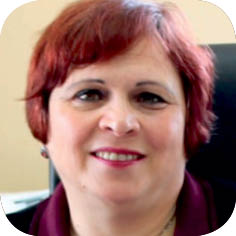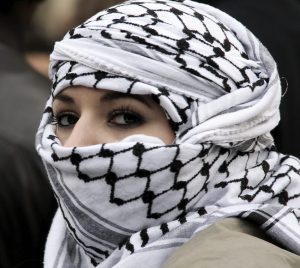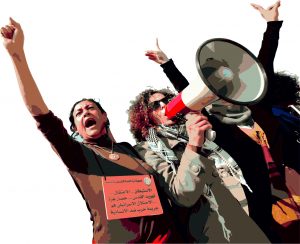Why has the Palestinian women’s movement after two decades of diligent work to combat sexual discrimination, violence against women, and patriarchy not yet been able to make a serious breakthrough in the adoption of policies and legislation based on equality, nondiscrimination, and the respect for women’s human rights? The dedication to our cause and the commitment to gender equality and nondiscrimination has not materialized; there has been no real, meaningful change in the lives of Palestinian women. Women have been able to make some progress, but patriarchal structures, discrimination, male domination, violence against women, sexism, militarization, and occupation remain serious obstacles to women’s full enjoyment of their rights within our society.
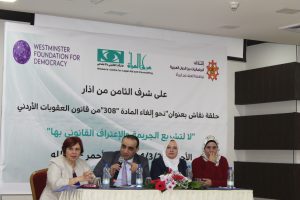
Even though the State of Palestine has adopted without reservations several international human rights treaties, including the Convention on the Elimination of all Forms of Discrimination (CEDAW), compliance with the norms and values enshrined in these treaties has not been translated into legal or policy reform that would reflect serious commitment to human rights principles. With Palestine’s accession to international treaties and conventions, Palestinian politicians and official duty bearers merely focused on political considerations, hoping to enhance “state sovereignty.” Hence, they paid little regard to their legal obligations under international law.
The political will to make serious efforts towards harmonizing national policies and legislations with CEDAW remains lacking. Negative patriarchal cultures and religious norms and practices still dominate the scene when it comes to women’s rights issues. The women’s movement was hopeful after the successful review of the CEDAW initial report before the Committee on the Elimination of Discrimination against Women in July 2018. Constructive dialogue and the legal commitment of the State of Palestine to the concluding remarks and recommendations of the committee seemed to assure that we had reached a breakthrough and would make a meaningful change towards reaching gender equality within the region.
“[W]hat is this state, from women’s point of view? The state is male in the feminist sense: the law sees and treats women the way men see and treat women….The state’s formal norms recapitulate the male point of view on the level of design.” Catharine MacKinnon*1
Before the review of the Palestinian CEDAW report, the Women’s Center for Legal Aid and Counseling (WCLAC), in cooperation with Human Rights Watch, delivered an oral statement*2 to the CEDAW committee that focused primarily on violence against women within the family and on Article 16 of CEDAW, highlighting questions related to personal status, gender-based violence, child marriage, sexual violence, and safe abortions. In accordance with Article 16, WCLAC also emphasized the issue of the Personal Status Law − applied in the West Bank and Gaza Strip to Muslims and Christians − and the discrimination against women it entails, especially when it comes to marriage, divorce, child custody, guardianship, child marriage, women’s marital financial rights, and inheritance. Subsequently, the committee recommended, in line with articles 1 and 2 of the convention, that the Palestinian state should adopt without delay national legislation that includes a comprehensive definition of discrimination against women, covering all prohibited grounds of discrimination and encompassing direct and indirect discrimination in both the public and private spheres.
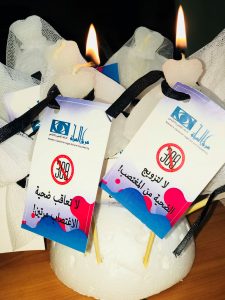
The official Palestinian delegation made the commitment before the committee to follow up on the recommendations and to submit, after two years, a special follow-up report on any progress made in the implementation of the recommendations, especially the ones related to policies and legislation harmonized with CEDAW. Shockingly, however, some conservative elements among Palestinian officials advised the president to consider imposing reservations on “international treaties” (namely CEDAW) four years after our accession to those treaties without reservations. Thus, the Palestinian women’s movement, instead of focusing its attention on the progressive implementation of CEDAW recommendations, had to return to square one. Through lobbying and advocacy efforts, it had to advocate again for the adoption without reservation of the conventions and treaties.
At the 39th session of the Human Rights Council, held in Geneva in September 2018, WCLAC delivered an oral statement in which it highlighted the gendered impact of the Israeli occupation and focused on Israeli violations committed against Palestinian women who did not pose an imminent threat to the life of others during the Great March of Return.
At all levels of Palestinian society, there is a clear headwind when issues related to gender equality are addressed. Nevertheless, WCLAC continues its efforts to ensure that women and girls can live their lives in accordance with the human rights to which they are entitled. Our advocacy always strives to challenge the core elements and obstacles that prevent women from achieving equality because women’s right are and should be an integral part of the various elements of state building. Without such equality, the principles of human rights and democracy cannot be guaranteed.
Due to the dysfunctional status of the Palestinian Legislative Council, considerable efforts have been put in place to influence the process of abolishing discriminatory articles from existing outdated laws, especially from the Penal Code, a remnant from the time when the West Bank was under Jordanian rule. Women’s and human rights organizations have successfully managed to launch a national advocacy campaign to urge the Palestinian government and the president to abolish Article 308 of the Jordanian Penal Code No. 16 of 1960. This article constitutes a flagrant violation of the rights of Palestinian women, as it exempts the perpetrator of 13 types of sexual crimes from prosecution in case of a valid marriage between the aggressor and the victim. The arbitrary article, which allowed for alleged rapists to marry their victims, was repealed on March 14, 2018, through an official decree by Mahmoud Abbas. In a cabinet decision, furthermore, modifications to the Penal Code were made through adding a fifth paragraph to Article 99, excluding honor crimes against women from their customary consideration of extenuating circumstances. Grassroots awareness-building campaigns, such as the white dress “Marry-Your-Rapist” initiative, aimed to influence state actors to actualize serious change towards women’s rights in Palestine.
Another major success was achieved this year in decisions taken by the cabinet to grant women the rights to issue passports for their children, open bank accounts for them, and transfer them between schools without the need for permission from a male guardian. Women’s rights organizations have been working on this topic for more than 18 years. WCLAC was one of the leading organizations in publishing supportive articles, studies, and analytical reports and holding awareness-raising sessions.
Furthermore, in 2018, a joint activity of women’s rights organizations and activists engaged in 16 Days of Activism to End Violence against Women and Girls in Palestine. This activity was organized by the Palestinian Forum to Combat Violence against Women (Al-Muntada) to demand amendments to laws that discriminate against women, such as the Penal Code, the Personal Status Law, and the Family Protection Law. Thus, in December 2018, a number of women’s organizations staged a peaceful protest in Ramallah, demanding the protection of women’s rights and the imposition of the harshest sanctions on those who violate them.
Also as part of the 16 Days of Activism, WCLAC implemented a workshop on “Legal Criminal Protection of Women: Between Public and Private Laws” on December 6, 2018. Around 20 people from various organizations attended this workshop that aimed to strengthen partnerships between women’s and human rights organizations. The legal framework of the criminal protection of women victims of domestic and social violence was discussed by highlighting the Draft Penal Code as a general law, and the draft of the Family Protection Law as a special law. The workshop also highlighted the social and legal urgency of issuing laws that protect women from violence and provide them with full access to justice.
During 2018, WCLAC also followed up on the developments of the Family Protection Law that intends to prevent violence against women and girls. This involvement was especially relevant because the draft law passed by the general prosecutor’s office was different from the draft that had been discussed with civil society organizations and the national committee drafting the law. A resulting campaign led by the Palestinian NGO Network (PNGO) engaged CSOs and human and women’s rights organizations in the policy-making process and produced a reviewed draft that was submitted to the Palestinian cabinet for the preparation of a final draft. The final draft was approved by the Palestinian cabinet in December 2018 and sent to the president for final endorsement, to be published in the official gazette. To accelerate this process, Al-Muntada for Combating Violence against Women, an umbrella structure that comprises 17 women’s organizations, is leading a national campaign that calls for the enactment of the Family Protection Law.
WCLAC met with the UN Commission of Inquiry and stressed the direct and indirect impact of Israeli violations against Palestinian women, submitting the study titled “Gaza’s Return Marches: The Gendered Impact of the Excessive Use of Force by Israeli Occupation Forces on Civilians,” which includes 15 testimonies from women in Gaza. It focuses on the targeting of civilians who did not pose any imminent threat to the life of others (including children and persons with disabilities); the targeting of human defenders, including journalists, paramedics, and civil-servant volunteers; and the excessive use of internationally prohibited weapons. In its concluding remarks, WCLAC asked that Israel be held accountable for violations of international humanitarian law and requested that the international criminal court open an investigation into these allegations.
Despite recent progress, it is striking to notice that the daily suffering of girls and women from legal, social, and domestic violence is a low priority on the political and social agenda of the state and its institutions. Social protection mechanisms for victims of gender-based violence remain insufficient even though a national strategy to combat gender-based violence has been developed. The lack of a gender-sensitive budget to implement this and other strategies reflects the actual status of these questions. Palestine’s accession to international conventions and treaties has not produced the credible political will to enact modern, nondiscriminatory laws that comply with these conventions.
The various human rights violations perpetrated by the Israeli occupation further exacerbate women’s suffering and discrimination against them as Palestinians and as women. Conflict escalation has both direct and indirect impacts on the lives of women because Palestinian women regularly face violence, threats, intimidation, restriction on movement, and discrimination as a result of Israeli policies that violate international humanitarian and human rights law. These policies include property destruction, demolition, and the lack of adequate housing; aggression against and targeting of civilians; restrictions on movement, night raids, the expansion of settlements, and settler violence; the forcible eviction of Palestinians from occupied Jerusalem; collective punishment as a tool in forcible transfer; and the targeting of women human rights defenders, women journalists, and female activists.
The report of the detailed findings of the independent international commission of inquiry on the protests in the Occupied Palestinian Territory,*3published in March 2019, referred to WCLAC’s testimonies and the information provided in its submission, providing the center with positive feedback and referring to its importance in helping the commission to understand the situation of Palestinians under Israeli occupation.
WCLAC documents testimonies by Palestinian women survivors of occupational violence and attacks. Women field workers are employed to collect these testimonies through interviews from women who live in the affected areas and who can give firsthand accounts of the effects of night raids and arrests on Palestinian women.
*1 Catharine A. MacKinnon, Feminism Unmodified: Discourses on Life and Law, Harvard University Press, 1988.
*2 WCLAC and Human Rights Watch oral statement to the CEDAW Committee on the State of Palestine’s Report, 70th session, July 9, 2018, Human Rights Watch, available at
https://bit.ly/2PxP9wu
*3 Report of the detailed findings of the independent international commission of inquiry on the protests in the Occupied Palestinian Territory A/HRC/40/CRP.2, UN Human Rights Council, March 18, 2019, available at
https://bit.ly/2SvSLz5

